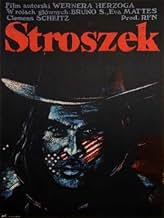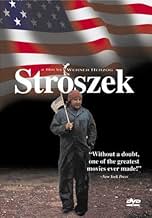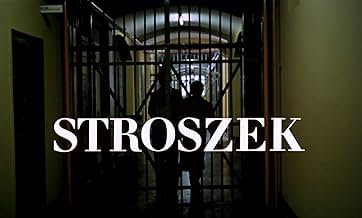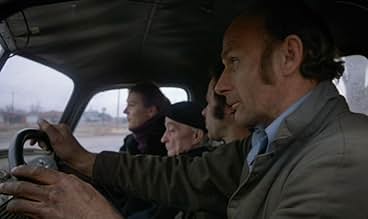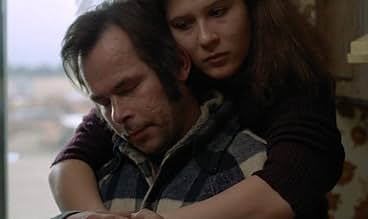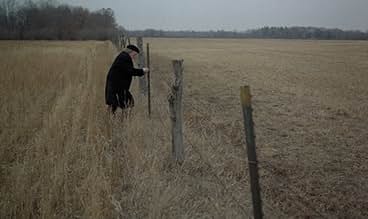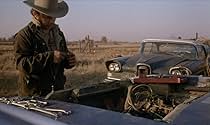A Berlino, un alcoolizzato recentemente uscito di prigione si unisce ad un amico e ad una prostituta per realizzare il suo sogno di lasciare la Germania e cominciare una nuova vita nel Wisco... Leggi tuttoA Berlino, un alcoolizzato recentemente uscito di prigione si unisce ad un amico e ad una prostituta per realizzare il suo sogno di lasciare la Germania e cominciare una nuova vita nel Wisconsin.A Berlino, un alcoolizzato recentemente uscito di prigione si unisce ad un amico e ad una prostituta per realizzare il suo sogno di lasciare la Germania e cominciare una nuova vita nel Wisconsin.
- Regia
- Sceneggiatura
- Star
- Premi
- 2 vittorie e 2 candidature totali
- Scott
- (as Scott Mc Kain)
- Doctor
- (as Dr. Vaclav Vojta)
- Turk prisoner
- (as Yücsel Topcugürler)
- Trucker Pimp
- (non citato nei titoli originali)
- Director
- Sceneggiatura
- Tutti gli interpreti e le troupe
- Produzione, botteghino e altro su IMDbPro
Recensioni in evidenza
"Stroszek" tells the fictional story of a real man named Bruno Stroszek. In other words, Stroszek plays himself in this eccentric film about a man who's released from prison, meets back up with his girlfriend and elderly buddy, and takes off for the fabled lands of....Wisconsin....to pursue the American dream. Anyone who's actually been to Wisconsin can probably guess how things play out for three immigrants with about three dollars between them. What follows is a series of vignettes that place Bruno in increasingly desperate straits and ends in an ambiguous finale that involves a ski lift and dancing chickens.
Welcome to the world of Werner Herzog, folks. "Stroszek" is not as compelling as some of Herzog's best, but it does inspire a sort of morbid fascination, if only because we take comfort that our situation isn't as bad as the one our characters find themselves in. But lest you are tempted to feel too sorry for Stroszek, he, like many of Herzog's protagonists, staunchly refuses to beg for sympathy, and faces one hardship after another with the dogged determination of a man who never fully understands how humble is his lot.
Grade: A-
The scene with the premature baby and the doctor is one of the greatest I've ever seen. It is just amazing, the character of that tiny infant, and shows Stroszek the fundamental power that he lacks, the tenacious nature of humanity to hold onto not only fellow human beings, but also to life itself.
The coin-operated live animals in the end represent not only cruelty and lack of compassion, but the obsessiveness of the American pursuit of entertainment. I personally felt more compassion for these creatures as victims of a system than I did for Bruno, who was pretty much doomed before he came to America.
The running commentary that Herzog has recorded for the recent DVDs of his films are among the most interesting and engaging I've heard, and they're one of the reasons I especially appreciate the DVD medium. That's not to say that he lets the literal-minded viewer off the hook by providing handy explanations for every peculiar image or bit of dialog. When asked what a certain image or phrase signifies, he will sometimes simply say that he cannot explain it. But I find it fascinating to watch a scene, and then scan back and listen to his comments about the location, actors, technical details, and yes, even sometimes the intended effect of a puzzling image. Many of the people seen in his films are non-actors, people he simply ran into, found interesting, and intuitively knew would be effective on film. Some of the players in Herzog's films are the very people that most directors would chase from their set with security guards, but he sees something interesting in them, and finds a way to tap into it. I can't help liking the man for that. Some people have suggested that his use of the unfortunate Bruno S. as a film actor amounted to some sort of exploitation. But it seems to me that his befriending of Bruno, and his artful and patient use of him as a film actor, must have given Bruno some sense of the dignity and worth as a unique human being that was denied him for most of his life. If this means nothing to you, and you don't know anything about Bruno S., the commentary tracks on either "Stroszek" or "The Enigma of Kaspar Hauser" explain his background nicely. It's a remarkable story.
If you're unfamiliar with Herzog's work, he has done some especially exotic films with the volatile actor Klaus Kinski. "Cobra Verde" is a particular favorite of mine. But his films do not have the relentless pace or hyperactive editing typical of mainstream American films. They are unforgiving of those with short attention-spans, so be forewarned.
The film handles the story of former asylum inmate Bruno S. (THE ENIGMA OF KASPAR HAUSER) as a Berlin street singer (in a role where he basically plays himself), who joins with his prostitute girlfriend Eva (Eva Mattes) and ageing eccentric friend Scheitz (Clemens Scheitz) to embark on a memorable journey, leaving modern Berlin, for the golden opportunities of America. The 'promised land' is represented by the dreary, austere town of Railroad Flats in rural Wisconsin, where they settle in a mobile home bought on credit, but it turns out America is not gonna fulfill their dreams that easily.
Shot in winter, Berlin is shown as a cold, forbidden and lacklustre place. Not a ray of sunshine. The dark facades of the battered apartment blocks, downlit bars filled with smoke and shabby characters, the only goal the folks in Bruno's world seem to have, is merely make the best of things.
Often read as a critique of how capitalist American society destroys the individual, Herzog sees the film as less a critique of the United States than as "a eulogy" in the wake of the American dream, for such shattered hopes could develop in virtually any country (see "Herzog on Herzog", p. 144). He does throw in some of the eccentricities of American life, but above all, it's a somewhat surreal account of three simple folks, short-changed in life, desperately trying to make ends meet. From the start it's clear that these three are made for each other. They simply do not fit in any stratum of society really. They're too fragile for the world of pimps and low lives that formed the background of their lives in Berlin. Although not dumb, Bruno is too half-witted to be taken seriously by most people. Eva's background is not fully explained, but she's emotionally fragile and dependent, while elderly Scheitz's chances to get ahead in life seems to lay in the past.
It's a bleak and uncompromising film, this tragicomic account of this odd trio in pursuit of a better life outside the dreary confinements of Berlin's lower casts of society, but it's so intensely moving and honest with its subjects, that alone is something to admire.
Camera Obscura --- 9/10
Lo sapevi?
- QuizThe entire crew disliked the last sequence so much that director Werner Herzog had to shoot it by himself. Incidentally, he considers this scene the best he has filmed.
- BlooperAfter Bruno, Eva and Scheitz buy a used car, they drive out to Wisconsin. The camera's shadow is visible on the car as Eva drives.
- Citazioni
[last lines]
Deputy Sheriff: We have a 10-80 out here, a truck on fire, we have a man on the lift. We are unable to find the switch to turn the lift off, can't stop the dancing chickens. Send an electrician, we're standing by.
- ConnessioniFeatured in Century of Cinema: Die Nacht der Regisseure (1995)
- Colonne sonoreOn the Way Down to Phoenix
Written and Performed by Chet Atkins
I più visti
- How long is Stroszek?Powered by Alexa
Dettagli
- Data di uscita
- Paese di origine
- Lingue
- Celebre anche come
- Stroszek
- Luoghi delle riprese
- Plainfield, Wisconsin, Stati Uniti(hold up on North Street)
- Aziende produttrici
- Vedi altri crediti dell’azienda su IMDbPro
Botteghino
- Lordo in tutto il mondo
- 3451 USD
Contribuisci a questa pagina


